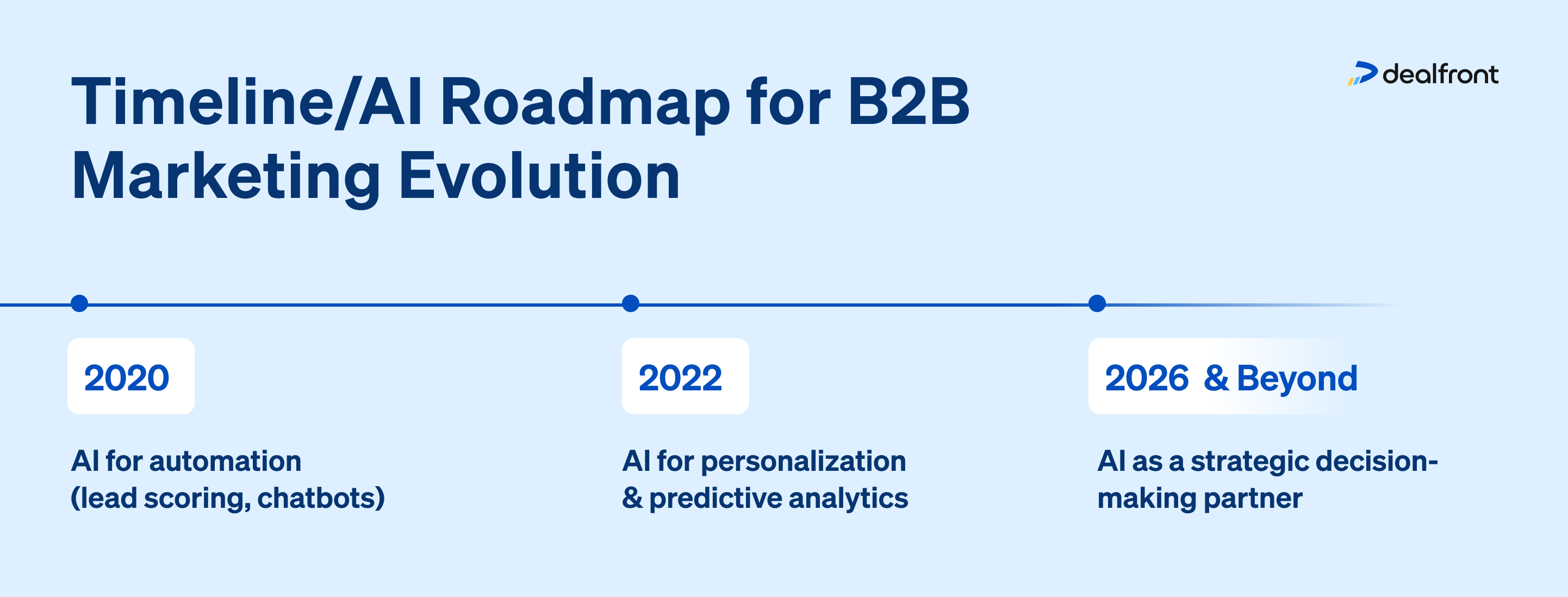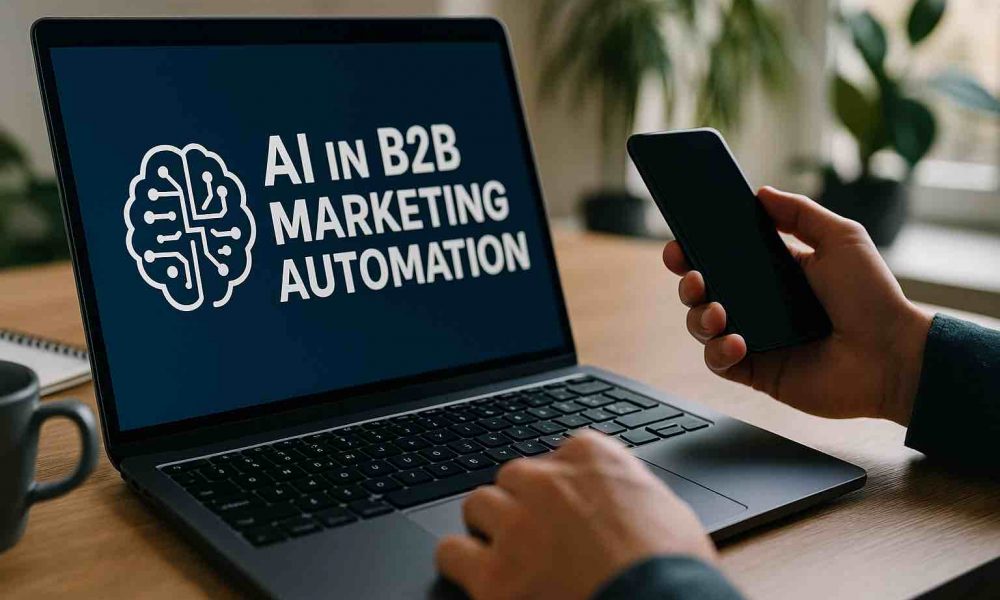Leveraging Growth Systems For B2B for smarter supply chain decisions
The Future of B2B: Utilizing AI Automation to Drive Success
The landscape of B2B is changing as firms significantly turn to AI automation for strategic advantage. This change guarantees to enhance performance and customer involvement with sophisticated innovations. The integration of these devices is not without its challenges. Recognizing exactly how organizations can browse this progressing terrain will certainly be important for future success. What factors will figure out the effectiveness of AI in this field? The answers might redefine conventional service models.
Understanding AI Automation in B2B
As organizations significantly seek efficiency, understanding AI automation in B2B ends up being essential. Growth Systems For B2B. AI automation refers to making use of fabricated intelligence modern technologies to streamline and improve organization processes. In the B2B industry, this entails the integration of AI tools to handle jobs such as information analysis, client communications, and supply chain procedures. By leveraging device discovering and all-natural language processing, companies can enhance precision, lower human error, and accelerate decision-making. Moreover, AI automation facilitates the handling of large volumes of information, making it possible for businesses to draw out important understandings and maximize their procedures. As organizations navigate this technological landscape, a complete grip of AI automation's capabilities will empower them to stay competitive and responsive to market demands
Key Advantages of AI Automation for Organizations
While many businesses grapple with enhancing operational needs, AI automation offers numerous advantages that can markedly boost their efficiency. One substantial benefit is effectiveness; AI systems can carry out repetitive tasks much faster and with greater accuracy than humans, thus releasing and reducing errors up staff members for even more strategic efforts. Additionally, AI automation allows data-driven decision-making by assessing vast datasets promptly, giving insights that inform company techniques. Cost decrease is another vital advantage, as automation reduces labor costs and maximizes resource allocation. AI can boost scalability, enabling organizations to adapt to market adjustments quickly. Ultimately, the combination of AI automation fosters advancement, enabling business to remain affordable in a rapidly progressing landscape.
Changing Customer Experiences With AI
AI is improving customer experiences by enhancing and making it possible for customized communications engagement. With the execution of anticipating analytics, businesses can expect consumer demands and preferences, causing more tailored services. In addition, streamlining support procedures with AI modern technology improves effectiveness and satisfaction, eventually changing the total consumer journey.
Personalized Interactions and Involvement

Predictive Analytics Execution
As organizations significantly seek to enhance consumer experiences, carrying out predictive analytics has actually arised as a critical strategy in the B2B industry. By leveraging data-driven insights, companies can anticipate customer demands and preferences, enabling them to customize their offerings better. Predictive analytics makes use of innovative algorithms and historic data to anticipate future habits, permitting services to identify prospective challenges and possibilities. This proactive strategy not only boosts customer satisfaction however also promotes commitment by providing prompt and appropriate options. Additionally, predictive analytics aids in resource allowance, guaranteeing that advertising and marketing efforts are focused on high-value potential customers. Inevitably, the combination of anticipating analytics furnishes B2B firms with the tools needed to change client communications and drive long-term success in a progressively affordable landscape.
Streamlining Support Procedures
Enhancing customer experiences in the B2B field prolongs past predictive analytics; enhancing assistance processes plays an essential function. By incorporating AI-driven remedies, companies can enhance and automate regular questions response times, causing enhanced customer complete satisfaction. Chatbots and online assistants supply 24/7 assistance, resolving customer requires without delay and reducing the concern on human agents. This automation enables teams to focus on intricate issues, cultivating more significant communications. Moreover, AI tools can analyze support data to determine fads and locations for renovation, ensuring constant improvement of service quality. AI Automation For B2B. As organizations embrace these innovations, they place themselves as customer-centric and responsive, eventually driving loyalty and company growth in a progressively competitive landscape
Improving Workflow and Processes
Streamlining operations and procedures in B2B atmospheres is vital for boosting total effectiveness. By optimizing operations effectiveness and automating routine jobs, companies can decrease hand-operated mistakes and liberate valuable sources. This shift not just enhances productivity however additionally makes it possible for groups to concentrate on calculated efforts that drive growth.
Optimizing Workflow Efficiency
Maximizing workflow effectiveness is crucial for businesses seeking to lower functional expenses and improve performance. By assessing existing processes, organizations can recognize traffic jams and redundancies that hinder efficiency. Carrying out streamlined treatments improves communication and cooperation among teams, making certain that tasks are finished a lot more swiftly. Making use of data-driven insights enables business to make informed choices that refine procedures even more. In addition, embracing incorporated innovations can facilitate smooth information flow, minimizing the danger of hold-ups and errors. As organizations embrace these adjustments, they not only cultivate a more active workplace yet also place themselves to respond promptly to market demands. Inevitably, focusing on process performance allows companies to allocate resources properly, driving long-term success in a progressively affordable landscape.
Automating Routine Tasks
Lots of companies are increasingly turning to automation to take care of routine tasks, acknowledging its possible to greatly boost functional performance. By releasing AI-driven services, business can simplify recurring activities such as data entrance, invoice handling, and consumer questions. This shift not only lowers human mistake yet also liberates useful staff member time, permitting team to concentrate on tactical efforts and value-added tasks. Furthermore, automation can boost feedback times and solution uniformity, bring about boosted consumer satisfaction. As companies navigate a competitive landscape, leveraging automation for routine tasks becomes important for enhancing process and maintaining dexterity. Inevitably, this strategy cultivates advancement and drives growth, positioning organizations for lasting success in the advancing B2B setting.
Enhancing Decision-Making With Data Insights
As businesses browse a progressively complicated landscape, leveraging information understandings ends up being necessary for notified decision-making. Minarik AI. By utilizing ai-driven devices and advanced analytics, organizations can change raw information right into workable intelligence. This enables them to determine fads, projection market changes, and optimize techniques based upon real-time details. Boosted decision-making procedures count on data visualization methods, enabling stakeholders to quickly translate intricate datasets and make swift, evidence-based selections. Additionally, insights originated from customer behavior and market dynamics empower business to tailor their offerings, boosting consumer satisfaction and driving growth. Inevitably, harnessing data understandings not just boosts decision-making efficiency however likewise settings organizations to remain affordable in a rapidly evolving market
Conquering Difficulties in AI Implementation
AI implementation holds the pledge of significant operational renovations, companies typically face a myriad of challenges that can prevent development. Key obstacles include data quality concerns, as lots of enterprises battle with insufficient or inconsistent datasets essential for efficient AI training. Additionally, resistance to transform within the workforce can impede the fostering of AI modern technologies, as workers may be afraid task displacement or do not have the needed skills. Budget restraints likewise present an obstacle, restricting investment in the called for facilities and talent. In addition, incorporating AI systems with existing processes can be intricate, demanding substantial time and resources. Getting rid of these challenges demands a tactical strategy that includes detailed training, modification monitoring, and a commitment to continual improvement in AI efforts
Future Fads: The Next Frontier in B2B Automation
While the landscape of B2B automation continues to progress, emerging patterns are positioned to redefine how organizations run. The assimilation of sophisticated fabricated intelligence will assist in more customized consumer experiences, permitting companies to tailor remedies precisely to client requirements. The increase of anticipating analytics will allow organizations to prepare for market changes and optimize decision-making processes. Automation of routine tasks through robotic process automation (RPA) will improve effectiveness, minimizing functional prices substantially. In addition, the fostering of blockchain modern technology assures boosted openness and security in transactions. As these developments gain traction, companies will increasingly utilize AI-driven understandings to cultivate cooperation, enhance supply chains, and improve general productivity, marking a transformative change in the B2B landscape.
Regularly Asked Concerns
What Sorts Of Companies Can Benefit Most From AI Automation?

Exactly How Can Local Business Apply AI Automation Successfully?
Small organizations can carry out AI automation effectively by recognizing repeated jobs, choosing straightforward tools, making certain sufficient training for staff members, and slowly incorporating services to maximize workflows while checking performance and changing approaches based on comments.
What Are Common False Impressions About AI in B2B?
Typical mistaken beliefs regarding AI in B2B consist of the idea that it is only for big ventures, that it ensures immediate outcomes, which it can fully replace human decision-making instead than boosting it.
How Does AI Automation Effect Staff Member Responsibilities and Job Protection?
AI automation improves employee roles by streamlining repetitive tasks, promoting performance and advancement. While some concern task loss, it commonly develops possibilities for upskilling and new settings, eventually improving task safety via included worth and performance.
What Abilities Are Required to Handle AI Automation Projects?
To handle AI automation jobs, individuals need strong analytical skills, project management competence, proficiency in data analysis, understanding of device knowing concepts, effective communication capacities, and flexibility to quickly altering technological environments. These abilities ensure successful implementation.
As businesses significantly look for effectiveness, understanding AI automation in B2B comes to be necessary. AI automation assists in linked here the handling of big quantities of information, enabling businesses to remove important insights and optimize their procedures. While several organizations grapple with enhancing operational demands, AI automation offers many benefits that can markedly boost their performance. Automation of regular tasks via robotic procedure automation (RPA) will improve efficiency, lowering operational prices considerably - Minarik AI. Production, logistics, and client service organizations can profit most from AI automation